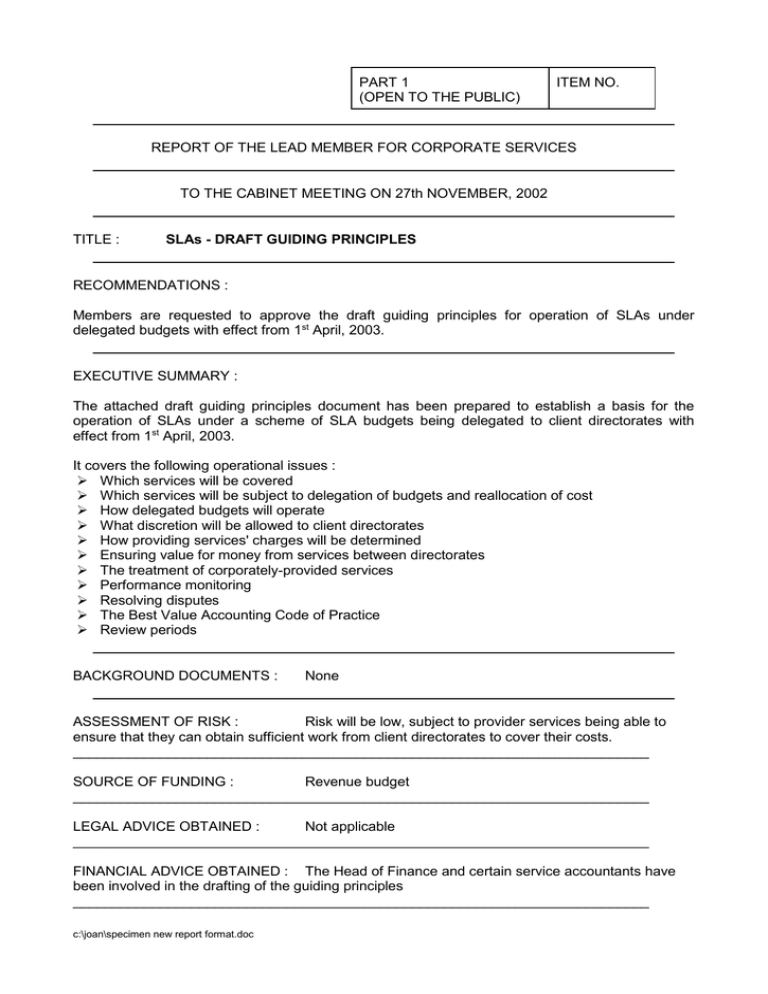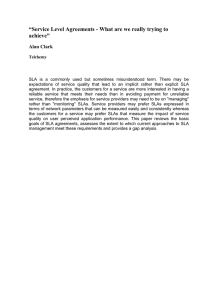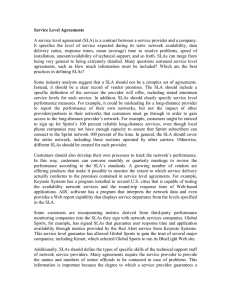PART 1 ITEM NO. (OPEN TO THE PUBLIC)
advertisement

PART 1 (OPEN TO THE PUBLIC) ITEM NO. REPORT OF THE LEAD MEMBER FOR CORPORATE SERVICES TO THE CABINET MEETING ON 27th NOVEMBER, 2002 TITLE : SLAs - DRAFT GUIDING PRINCIPLES RECOMMENDATIONS : Members are requested to approve the draft guiding principles for operation of SLAs under delegated budgets with effect from 1st April, 2003. EXECUTIVE SUMMARY : The attached draft guiding principles document has been prepared to establish a basis for the operation of SLAs under a scheme of SLA budgets being delegated to client directorates with effect from 1st April, 2003. It covers the following operational issues : Which services will be covered Which services will be subject to delegation of budgets and reallocation of cost How delegated budgets will operate What discretion will be allowed to client directorates How providing services' charges will be determined Ensuring value for money from services between directorates The treatment of corporately-provided services Performance monitoring Resolving disputes The Best Value Accounting Code of Practice Review periods BACKGROUND DOCUMENTS : None ASSESSMENT OF RISK : Risk will be low, subject to provider services being able to ensure that they can obtain sufficient work from client directorates to cover their costs. _________________________________________________________________________ SOURCE OF FUNDING : Revenue budget _________________________________________________________________________ LEGAL ADVICE OBTAINED : Not applicable _________________________________________________________________________ FINANCIAL ADVICE OBTAINED : The Head of Finance and certain service accountants have been involved in the drafting of the guiding principles _________________________________________________________________________ c:\joan\specimen new report format.doc CONTACT OFFICER : John Spink WARD(S) TO WHICH REPORT RELATE(S) : KEY COUNCIL POLICIES : Budget Strategy DETAILS (Continued Overleaf) c:\joan\specimen new report format.doc TEL NO : None 793 3230 SERVICE LEVEL AGREEMENTS and DELEGATED BUDGETS DRAFT GUIDING PRINCIPLES Operative Date The new arrangements will come into effect for 2003/04, ie from 1st April, 2003. What SLAs will be covered ? These principles will apply to all SLAs, whatever their source. Predominantly, they will come from central support services, ie :Corporate Services ( for Finance, I T and Law & Admin ) Personnel and Performance Development Services (for Property). However, other charges between directorates will also be covered by these arrangements. Charges from DLO/DSOs will not be covered by these arrangements. What will be delegated ? Charges via SLAs can be classified into 3 categories :Category of Service 1. Operational and Support Services Services over which client directorates can exert direct influence 2. Corporately Provided Services Services the level of which are determined corporately or which are "lumpy" in nature between clients from year to year 3. Democratic/Core Functions Services which are provided for the benefit of the Council as a whole or which by their nature are inappropriate to charge to clients Devolve budget to client directorates? Yes No, but the charges and matching budget will be allocated to clients to comply with BVACOP Yes, but directly to the Chief Exec's budget A schedule of the various services which fall into each of these categories for each provider is included at Appendix 1. c:\joan\specimen new report format.doc How will devolved budgets work ? Client directorates will have discretion to utilise devolved SLA budgets to buy support services and other recharged services as they wish, subject to the conditions of these guiding principles. If a client decides in agreement with the providing service to buy less support services it may utilise the resulting saving for the benefit of other parts of their service or, if appropriate, as a budget saving. Equally, if a client wishes to buy more of a support service they will need to vire budget into the budget for support services from elsewhere within their budget allocation. Devolved SLA budgets will only apply to services falling into categories 1 and 3 above. Devolved SLA budgets will be separately identified from reallocated SLA budgets (category 2 above) on the SAP budget database. Devolved SLA budgets will operate from the financial year 2003/04 onwards. What discretion will a client directorate have ? There will be annual negotiations between provider and client with regard to the level of service provision and charge for each financial year. These negotiations will be prompted by the provider producing a fully costed proposal for consideration by the client by no later than 30th November prior to the year in question. This will enable the SLA process to dovetail with the budget timetable and enable the client to consider the potential for any budget savings from SLAs in keeping with any such requirements of the Council's budget strategy or to consider variations to the SLA in keeping with their service plans. Once the level of service and charge are agreed, the annual agreement within the 3-year SLA will normally be expected to operate for the full duration of the financial year in question. However, in-year variations will be possible by agreement with both parties. It is more likely that increases in service can be accommodated and agreed by both parties, particularly if requested by the client, than reductions in service. In order to avoid sudden workload shortages, potential for redundancy and unnecessary corporate budgetary problems, the provider shall be entitled to a minimum of six months notice of any variation but can have the discretion to waive this notice requirement. The in-house provider will be given a 3-year "contract" with effect from 1st April, 2003. Thereafter, if the client wishes to terminate the in-house service they must give 12 months notice. Follow-on contracts after the initial 3-year period should be for a minimum 3 years, or otherwise as agreed by both parties. (NB. It should be noted that an SLA may be based around a service provided by an external provider and will need to have regard to the terms of the contract with the external provider) c:\joan\specimen new report format.doc Regard would need to be given to the implications for the Council as a whole for a support service if a single client, or group of client, directorates believed that the in-house service was not delivering a cost effective service that could not reasonably be improved, or had been given the chance to improve and had failed, and that an alternative service provision should be explored. Such instances should be considered by Directors Team as to whether an early best value review of the service or alternative options should be explored. How will support service providers determine their charges ? SLAs from providers will be based on the following principles : adopting a trading account approach to aim to ensure that income from SLA charges to clients covers expenditure ; charges for services will be fixed price linked to estimated transaction volumes, or hourly rate x estimated number of hours, wherever possible ; charges will be agreed for the year and will not be varied unless there is a fundamental change to the service provided/expected ; variations will be agreed with clients ; charges will be based on the budgeted cost of delivering the service, including staffing levels, planned savings commitments and casual vacancy rates. SLA proposals will provide comparative information that seeks to demonstrate value for money. Such information will also include the outcomes of any recent best value reviews where cost comparisons have been undertaken. It will not normally be expected that the provider should detail to the client how they have compiled their proposed charges unless this would assist the client in an understanding of, or an assessment of, the competitiveness of the charge. How will client directorates be assured of receiving services which give value for money ? The best value review process will be one of the means by which the cost effectiveness of services will be measured. In addition, to enable the client to form a judgement about value for money from the service provided, SLA documentation will contain information from the provider which : Sets out the standards and quality measures expected from the service ; Compares performance and cost against other providers ; Identifies planned service improvements ; Identifies the outcome of best value reviews and any service inspections. c:\joan\specimen new report format.doc Who will be the client for corporately-provided services where costs are simply reallocated? The Chief Executive through the Procurement Team, on behalf of all directorates, will confirm the reasonableness of the SLA for corporately-provided services (category 2 above) prior to their reallocation of costs to directorates. Monitoring Performance Quarterly monitoring meetings should be held between provider and client to review service provision issues and to resolve any problems. It is envisaged that both client and provider directorates will nominate key contacts to facilitate the process. Who will resolve disputes The Chief Executive through the Procurement Team will arbitrate on any dispute. What is the purpose of the Best Value Accounting Code of Practice (BVACOP) ? The BVACOP has been produced by CIPFA as recommended best practice in the allocation of costs between services. It has statutory backing and aims to ensure consistency of treatment across all local authorities so that all accounting statements, eg budgets, statements of accounts, BVPIs, BVPPs, adopt common standards and can facilitate valid cost comparisons. The SLA framework therefore needs to operate, for accounting purposes, within the guidance contained in the BVACOP. Review There should be an annual review of these guidelines at Directors Team. c:\joan\specimen new report format.doc


